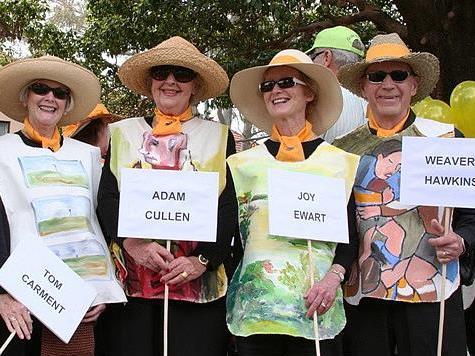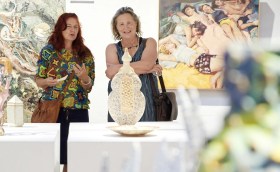AGNSW volunteers at the Mosman Festival
Almost every museum in Australia (and elsewhere) began as a result of the efforts of a few passionate volunteers; almost every museum has grown through the ongoing support of what may have become over time a separate organisation – and almost every museum has – or will soon – had a run-in with those volunteers over governance. As day follows night, so almost every volunteer-run organisation will eventually hit the point where the back of an envelope and the coffee-tin full of receipts is just not good enough.
At that point things begin to go feral – the museum will start to get worried – they are held to account on things like finance and health and safety and any issues with the volunteer organisation could spill over. The volunteers get upset – they feel that their passion and support is not recognised or wanted – big brother is hounding them over minor points of bureaucracy. The energy and firepower that made them once fight to save the site or collection (or locomotive or historic ship or park or endangered species) is now turned full blast on the bigger organisation. Things get bitter and divisions grow.
Suddenly no one is winning – not the museum or the volunteers or members or the people who just want to enjoy themselves by visiting the sites or helping out.
The problem is that governance matters. Whether you are a multi-national or a tiny community group, what you do with other people’s money, how transparent you are and how well you operate is just as important for your reputation as your expertise and commitment.
Of course this issue goes beyond museums – any organisation large or small that involves volunteers and professionals will face it eventually – from giants like Legacy or the Red Cross with thousands of volunteers to the smaller indigenous corporations featured in last week’s ABC Four Corners.
For most bigger museums such as the National Museum of Australia, the Powerhouse, the Australian War Memorial and the Australian Museum, the solution has been to bring the administration of separate volunteer or friends organisations in-house – enabling the friends to then focus on what they enjoy and are best at – often social events and using their skills to make a difference to specific areas of work.
For others it maybe a question of getting help. In NSW the Office of Fair Trading or Consumer Affairs in Victoria provide some advice, for others it may be a board member or volunteer whose expertise is actually in corporate governance. After all, skills in governance are just as important to a museum or heritage organisation as being able to repair an ageing locomotive, recreate convict costumes or catalogue the moth collection.
This is a matter of not if, but when. Sooner or later these tensions will arise and will need to be resolved. What makes the papers is the bad stuff and not the next great exhibition or event. Dirty linen is dirty linen – even if it is washed in a nineteenth century copper. If nothing happens, the locomotive rusts, the convict event is a failure and the moth collection flies out the window, and the next thing you know – the doors are closed.
Governance is one of those things that, if done well you never hear about. Done badly (or worse still, ignored) – everyone knows.





